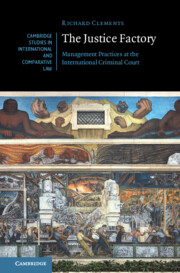Book contents
- The Justice Factory
- Cambridge Studies in International and Comparative Law: 182
- The Justice Factory
- Copyright page
- Contents
- Figures
- Acknowledgements
- Abbreviations
- 1 Introduction
- 2 A History of the International Criminal Court’s Managerial Present
- 3 The Managerial Court
- 4 The ICC Expert
- 5 ICC Legal Argumentation
- 6 ‘In a Technical and Political View’
- 7 Conclusion
- Select Bibliography
- Index
- Cambridge Studies in International and Comparative Law
2 - A History of the International Criminal Court’s Managerial Present
Published online by Cambridge University Press: 01 December 2023
- The Justice Factory
- Cambridge Studies in International and Comparative Law: 182
- The Justice Factory
- Copyright page
- Contents
- Figures
- Acknowledgements
- Abbreviations
- 1 Introduction
- 2 A History of the International Criminal Court’s Managerial Present
- 3 The Managerial Court
- 4 The ICC Expert
- 5 ICC Legal Argumentation
- 6 ‘In a Technical and Political View’
- 7 Conclusion
- Select Bibliography
- Index
- Cambridge Studies in International and Comparative Law
Summary
Most ICC commentators are enthusiastic about the promise of management as a way to optimise the court’s performance. Yet few are as eager to historicise the practices they advocate. Chapter 2 seeks to read the court’s managerial present through its past deployments, journeys, and consequences for other institutional projects long predating the contemporary Rome Statute system. The chapter begins by tracing the uses of management in such institutions as the plantation, war, and the nineteenth-century factory before following them as they entered the practice of early international institutions. Beyond these spaces, a major part of management’s pre-history lies in its invocation at the United Nations after decolonisation. The chapter demonstrates that two of management’s key assumptions – regarding its lack of history and its claim to political neutrality – are only the ‘truth effects’ of protracted expert and political struggle within various institutional spaces. The most important of these for the ICC has been the United Nations, where management formed part of a counter-strategy against the democratisation efforts of newly decolonised states. Whilst purportedly neutral today, the management practices taken up at the ICC continue to bear the scars of these earlier political wins and losses.
Keywords
- Type
- Chapter
- Information
- The Justice FactoryManagement Practices at the International Criminal Court, pp. 37 - 89Publisher: Cambridge University PressPrint publication year: 2024

